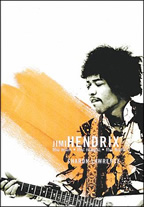 |
| |
|||
| Posted on Wed, May. 11, 2005 | |||
 Confidante writes of the Jimi she knew The Man - The Magic - The Truth By Sharon Lawrence HarperCollins. 352 pp. $24.95 'Here I come baby ... I'm comin' to get ya ... Oooh Foxy lady ..." Where were you when you first became experienced? I was totally unsuspecting when classmates made me listen to the Jimi Hendrix Experience right after my first day of high school. We played "Are You Experienced?" for hours, shouting expletives at every guitar note as Hendrix psychedelically accelerated us from pre-puberty to wisdom, to a place where our lives were forever defined by the music of that summer. In Jimi Hendrix: The Man - The Magic - The Truth, Sharon Lawrence revisits the Hendrix era in a deeply personal way. As a UPI reporter in Los Angeles, Lawrence met Hendrix in 1968, when he was already a prisoner of his sudden fame. As a valued friend outside of the groupies, druggies, and agents in constant orbit around him, she is able to provide a unique description of that existence, one needed to understand the supernova of Hendrix's musical reign. In three years Hendrix established himself as the world's best guitarist, a crossover black artist before the term was invented, a musical visionary who also defined an era's fashion sense. He also fell into the ravages of excess. On Sept. 18, 1970, at age 27, he died by barbiturate overdose, suffocated in his own vomit. His talent and life have led to the facts, fallacies and conspiracy theories that have proliferated since that day. Stepping in and out of Hendrix's life as their various travel schedules intersected, Lawrence became his trusted companion, going from clothes shopping with him to being the first at the London hospital where he was pronounced dead. She writes to dispel much of the false information about his life and death. More important, she wishes to describe the Hendrix she knew as a man-child of immense talent, yet with a "complete lack of pretense or self-importance." Lawrence provides illuminating information about Hendrix's fractured childhood with an absent father and alcoholic mother, and his odd stint as Army paratrooper. His early career on the "chitlin circuit" - with Curtis Knight, the Isley Brothers, and Little Richard - doesn't seem to presage a musical genius, yet he ultimately conquered the English musical scene during the days of Eric Clapton and Cream. Many of these stories have appeared before. The value of Lawrence's tale is in what Hendrix confided to her, especially about his music: "It's all about the tones... . You hear the sound in your head or your heart, and you send a message to your fingers." The days of hearing these sounds in his head or heart could not last, as the music and times created a haze of drugs, women, and legal issues. Hendrix barely kept his head above this chaos as the idealism of Woodstock and the budding antiwar movement became intertwined with his music. A guitar god to white audiences, Hendrix also came under pressure from black militant groups because he claimed "I'm only a musician" and was not a spokesman for their cause. Lawrence chronicles Hendrix's state as he eventually succumbs, with details of his last days that have never appeared before. She spoke with Hendrix the night of his death, and the next day confronted Monika Dannemann, the woman with Hendrix when he died. With this information Lawrence is able to write convincingly about what she believes happened later that evening. Lawrence's writing style may leave the reader wondering how Hendrix and she connected; with its frequent mention of shopping trips, the sound seems more that of an entertainment beat writer than of Jimi's confidante. Yet she was that, and as a result is able to give us a rare glimpse of the life and death of a rare artist. Richard Di Dio has played bass guitar since the first day of high school. He teaches mathematics and physics at La Salle University. |
|||